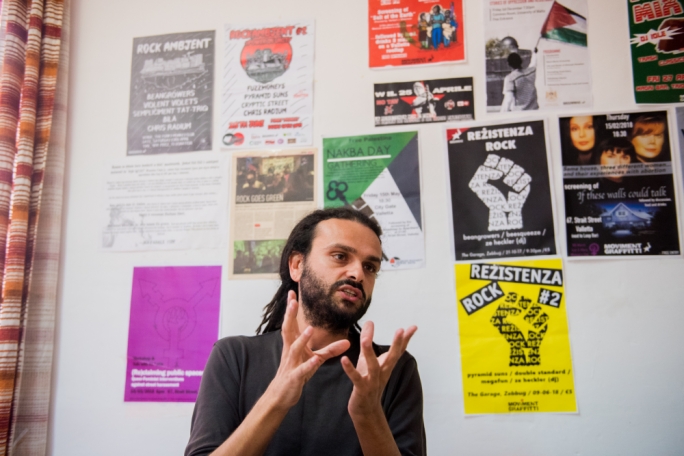At last Tuesday’s protest march, there was a minute’s silence for the seventh victim of fatal accidents on construction sites in the last year and a half. Do you see a correlation between the safety issues concerning residents, and the evident exploitation of (mostly foreign) workers on construction sites?
Exploitation takes different forms. It’s not just workers on construction sites: residents of areas targeted by development are also being exploited. The places where they live are being taken over, and their lives are being made hell. That, too, is a form of exploitation. But when it comes to workers, exploitation is going on big-time, and not just in the construction sector. There is illegal exploitation – in the sense of people being employed illegally, underpaid, or not paid at all; and often threatened by their employers. But there is also legal exploitation. The laws regulating employment conditions, salaries, etc., are so inadequate, that they leave plenty of room for abuse. This is not an issue that affects only foreign workers… Maltese workers are exploited, too… though in the case of foreigners, the situation is usually much, much worse…
Can you give an indication of the extent of the problem,from your own experiences with the people concerned?
I have a lot of friends and contacts within the local African migrant communities, some of whom I have known for years. And they all say that they are systematically threatened by employers all the time. Sometimes, even their lives are threatened. The level of exploitation here is rampant. And the more these people are marginalised, even through public discourse, the more this exploitation will increase. Their societal power is constantly diminishing, leaving them with no recourse to any action in such cases. They live in fear; in a state if systematic abuse…
‘Systematic abuse’ suggests that it is the system itself (and not individual employers) that is exploiting those workers. How so, exactly?
Let me put it this way: when Prime Minister Muscat recently said that ‘he didn’t want to see Maltese workers collecting garbage’… a lot of people took that to be a ‘slip of the tongue’. But I didn’t see it as a slip at all: I saw it as a reflection of his government’s economic policy. Clyde Caruana, of Jobs Plus, has been saying the same thing for years: there is a specific, very deliberate policy to import foreigners so that they can be legally exploited. And the government, the relevant authorities, etc., all accept this, as if it’s perfectly OK. But it’s not OK: it is highly dangerous to create that sort of segregation in the job market. That the authorities permit Maltese employers to exploit those workers is, to me, deeply shocking…
Yet Malta is an EU member state, which also implies certain standards across the board: including employment conditions. Is it possible that no form of institutional protection exists for this category of worker?
Some form of protection might exist on paper, but in practice, the authorities are doing absolutely nothing about the issue at all. And that’s where it counts: these things have to be resisted pro-actively. You can’t wait for an employee to file a report against his employer, in a situation where employees are so vulnerable. Especially foreign workers who are employed illegally: they have a guillotine over their heads. They could be deported if they dare to complain. And they shouldn’t have to, because it is the authorities’ job to monitor the situation. They have to go to the worksite; conduct inspections; and offer protection where there is none. This is simply not happening…
Yet several authorities exist for that very purpose: the ETA, the OHSA, etc. Are they all just nominal authorities, with no real power at all?
The situation varies from authority to authority: it is not the same in all cases. But I don’t think the problem arises from the people who work within those institutions; it arises from the general framework. And this ties in with the situation that has now developed, with buildings collapsing, and residents left homeless. The interest of businessmen who are trying to ‘make a buck’ always comes first: in this case, it came before the authorities’ capability to regulate the industry, and to ensure that the regulations are respected. We have allowed the economy to keep growing and growing disproportionately – and I don’t think everyone is feeling the benefits; but let’s leave that aside, for now. The point is, we have seen the economy grow exponentially, but at the same time there are no structures in place to see that things are being done properly: i.e., that the rights of workers are respected, that the concerns of residents are addressed; that the permits issued are properly assessed and adjudicated. All those things come about only as an afterthought… if they even come about at all. The only important thing, from government’s side, was to formulate all the policies so that a few big businessmen can make a lot of money. Everything else: including all the checks and balances to safeguard the rest of Malta’s interests… those were never a concern at all.
But while Moviment Graffitti champions residents in affected areas, it clearly does not speak on behalf of society as a whole. There doesn’t seem to be a groundswell of discontent at the situation, despite the fact that it arguably affects everyone across the board. Do you see this as a contradiction?
The contradiction exists, it would be useless to deny it. People do not live in a vacuum: they are born into a system; a society which promotes certain values and ideas. For instance, the illusion many people have, that they can become rich very quickly… that is now very widespread. And it is an illusion: the reality is that the vast majority will not get rich at all, let alone quickly. But the belief thatit is possible… that has become part of the ‘aspirational Malta’ we are living in today. Malta has become an immensely aspirational place; it is reflected everywhere in popular discourse. Everything is target- ed at individuals who believe their life can, and should, get materially better. It is a mentality that can be traced back to the early 1990s: when we started measuring the status of a human being by how much money he has in the bank; what sort of house he lives in, how many cars he has, his lifestyle, and so on. You could say it was ‘introduced by the Nationalist Party’; but Labour has now taken it to new extremes. All the Labour Party’s campaign videos, for example, focused exclusively on popular aspirations: the ambition to be this, the ambition to do that…
Is that such a bad thing, though? Aren’t people within their rights to ‘dream big’, even if those dreams don’t come true?
I would say that… no, having a highly aspirational society is not necessarily a good thing, in the long term. It only gives rise to more exploitation. Because instead of people banding together to collectively improve their conditions of work, and to create a fairer economy… it’s a case of ‘each man to his own’: everybody convinced that he will become richer than everyone else, and faster, too. That mentality is there, and it is very strong. But the conflict is still there, too. It is not true that all of society has the same goals and interests. The interests of big business are not the interests of workers, or of residents who are seeing their own quality of life deteriorating. So, while the model is undeniably there… there are also a lot of cracks in it. Materially, people know when they’re being exploited. They feel it when their salary doesn’t last them the month… or when they find it impossible to get a roof over their heads, because they can’t get a loan with the salary they have, and the cost of property shooting up all the time. If they’re choking on construction dust, or afraid to live in their homes because they’re demolishing next door… these are not things you can sweep under the carpet.
Would you say there is, in fact, more groundswell discontent than can be measured by attendance at protest marches?
What we’ve been seeing in recent years – long before the latest development concerning the db project – is that the feeling, on the street, is changing. Moviment Graffitti has been working directly with local communities for a long time now: enough to get a sense of how things are on the ground. Right now, the sensation is that people are angry. And they come from different political backgrounds: political allegiance is no longer a factor at all. When we meet residents, we wouldn’t have any idea whether we’re talking to Nationalist or Labour voters. It doesn’t even come out in the discussion. They will all be feeling the same sentiments: they’re all facing the same situation. They know that while the economy is steadily growing, their own quality of life – in practice, every day – is not improving, but actually getting worse…
But there is also the sensation that Malta’s economic growth is too dependent on the construction sector. We saw this in 1987, and also in 2013. Government’s strategy for a speedy economic recovery has always been to open the floodgates of construction. Isn’t there a danger, then, that by putting the brakes on, the shock to the economy might be too severe?
When you look at the facts and figures about what really contributes to the economy… the construction sector is there, but it isn’t as large as a lot of people make it out. There are other, much bigger contributors. But it is true that a building boom can speed up the rate of economic growth… at an enormous cost. But we have to bear in mind that – even just from a purely economic angle – this is a finite resource. In a sense, ours is an ‘extractive economy’, like those of countries which rely on natural resources such as coal, oil, or gas. Only in our case, the resource is land: which is also the land we live in. A point will be reached where there’s simply nowhere left to build.So, in the long-term, it doesn’t even make sense as an economic policy. Then we have to consider the impact on other sectors. Tourism, for instance. A lot of the tourists who come to Malta go back with a bad impression. I hear this from tourists and tour operators all the time. ‘Sorry, but this country is ugly.’ And you can’t even deny it, because everywhere you look… well, you can’t really say that what you see is ‘beautiful’. Let’s face it: it isn’t. The Malta we are building is ugly. It’s partly the type of buildings that are going up; partly the sheer amount of buildings; the way they are going up… All this diminishes the value of our tourism product, to stick only to the economic argument. But it’s also about the economic model as a whole.We cannot continue to base our model solely on ‘economic growth at all costs’. I would prefer a lower rate of economic growth – because there has to be growth: it is the extent I am questioning, not the growth itself – coupled with a higher quality of life. The distribution of resources could be better, too. Compared to other countries, Malta has extremely low tax rates for the rich. Raising those tax rates might have a dampening effect on growth rates – which is not a bad thing, in itself – but it would result in higher revenue that could bemore fairly redistributed. That is a viable economic model, too.
Meanwhile the court’s ruling against db’s Pembroke project seems to have raised hopes that such battles can occasionally be won. Do you see this as a turning point in the fight for a new planning regime?
When it comes to the planning system in general, I would be wary of using terms like ‘turning point’. If the planning system ‘doesn’t work’, it is not because it is inefficient, or flawed. It doesn’t work because there are interests in ensuring that it doesn’t work. In fact, the planning system works very well… for some people, but not for others. I don’t think the court’s decision will change any of that. But it does have a lot to contribute: not just with regard to the project itself, but also as a beacon of encouragement. It shows that, yes, people do have ways to resist certain things. One thing I can’t stand is to hear people argue that ‘it’s all useless’; ‘everything’s already decided’; ‘everything is corrupt’… these are all defeatist comments, and as such they are just a very good excuse to do nothing. As activists, we know from experience that people can and do make a difference. And right now, there is a feeling that things have become so bad, that people really do have to at least try and change the system. When you imagine what Malta might become like in 20 years’ time… it’s frightening, really. A dystopia: a place where you can’t even move about any more. No open spaces anywhere. So yes, one can talk perhaps of a turning point… although it has long been in the making. People have been feeling helpless for years, but now things have gone too far. With this court ruling, they will hopefully realise that they can get together and organise themselves to make a difference. It’s an opportunity we have to grasp, and build on as best we can. But at the same time, it’s only one battle that has been won. We haven’t won the war. There are many more battles to go.




